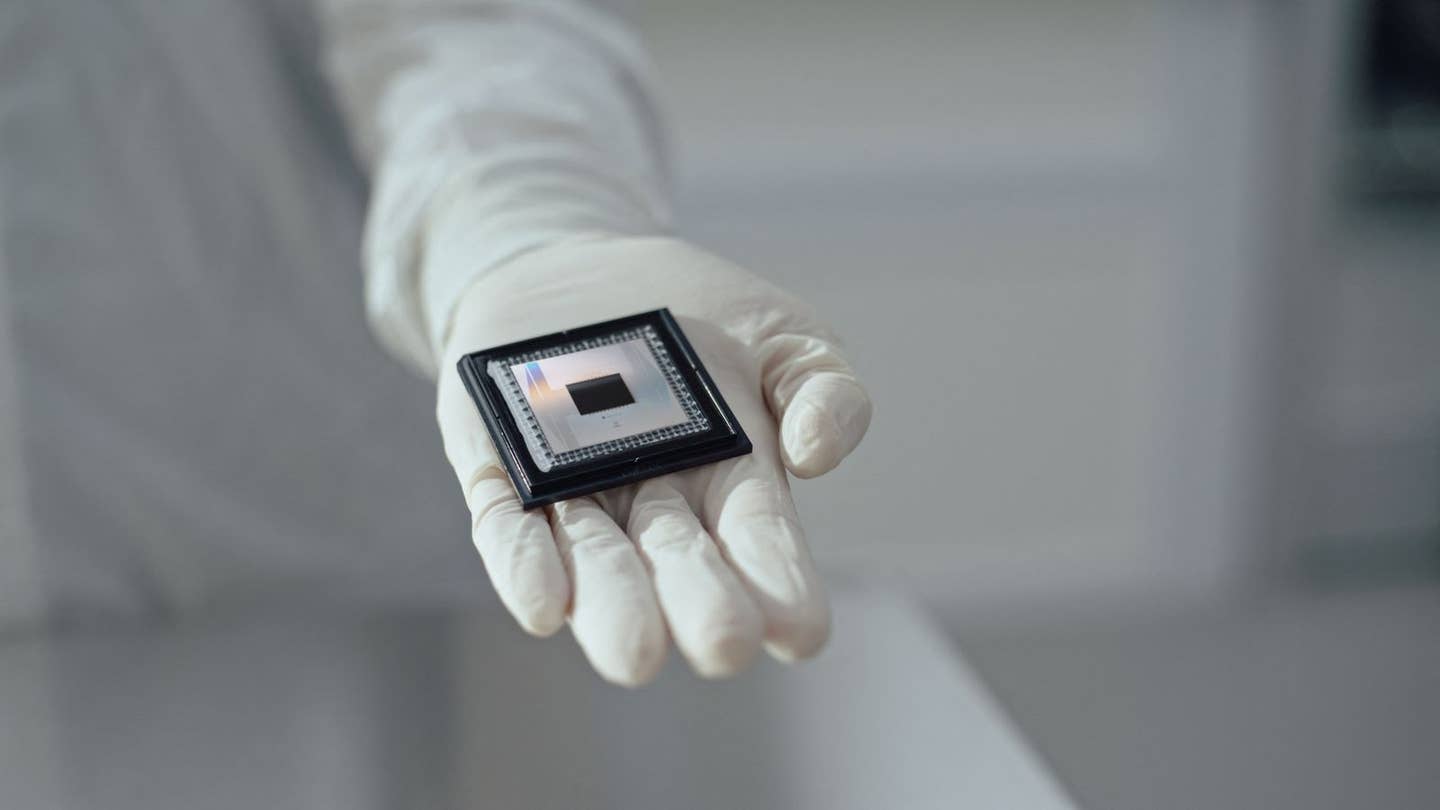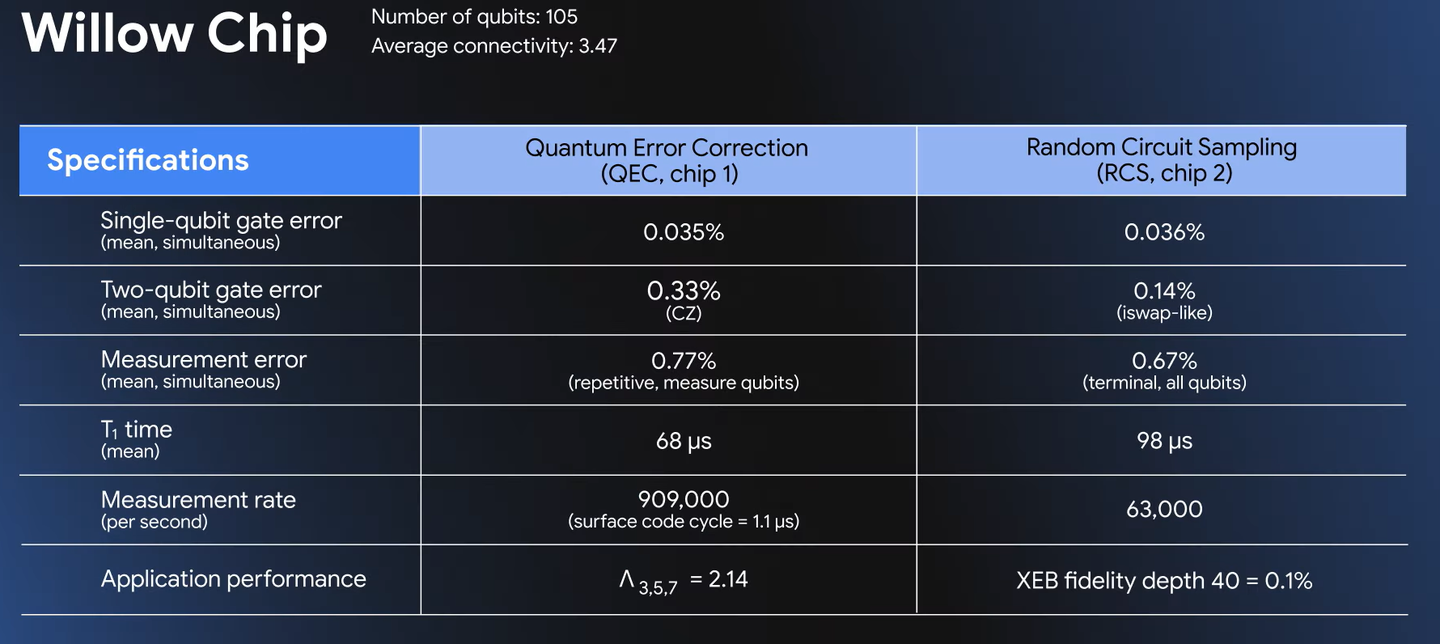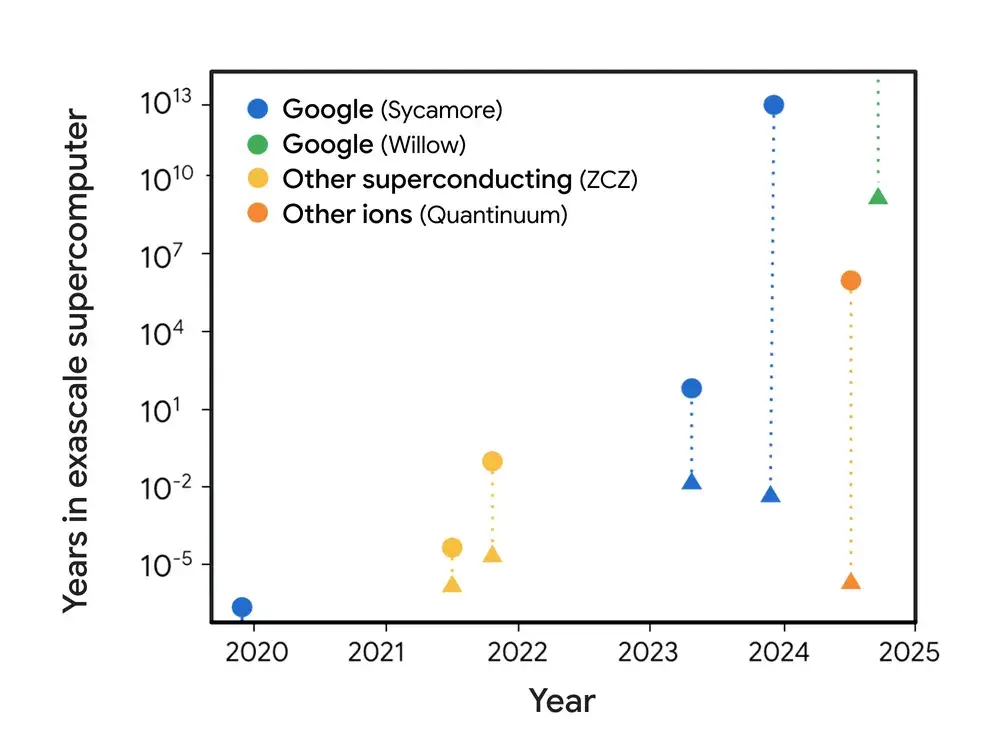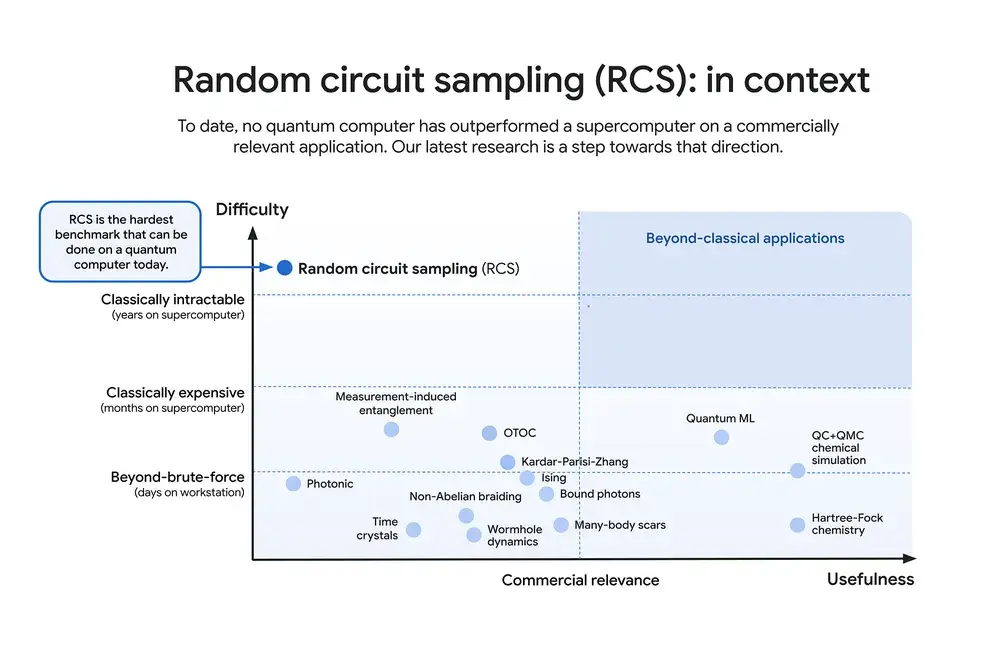
Posted on 12/12/2024 12:00:19 PM PST by ShadowAce
The field of quantum computing has taken a giant leap forward with the development of the Willow chip. Over a decade in the making, this achievement stems from a vision to harness the fundamental principles of quantum mechanics for scientific discovery, problem-solving, and transformative applications. The Willow chip represents a major step toward realizing large-scale, commercially useful quantum computers.
A critical hurdle in quantum computing has been error correction. Qubits, the foundational units of quantum computation, are notoriously fragile and prone to interacting with their environment, leading to errors. These errors increase with the number of qubits, often rendering the system ineffective.
The Willow chip addresses this challenge with groundbreaking advancements in quantum error correction, achieving what experts call “exponential quantum error correction” or operating “below threshold.” This means that as the number of qubits in the system increases, the error rate decreases exponentially.
Published in Nature, recent findings show that Willow can scale from a grid of 3x3 encoded qubits to larger arrays, including a 7x7 grid, while halving error rates with each expansion. This milestone marks a historic achievement first envisioned by Peter Shor in 1995.

Real-time error correction is now possible on a superconducting quantum system, demonstrating that qubits in an error-corrected array outlive individual physical qubits. These advances establish Willow as the most compelling prototype for a scalable logical qubit system to date.
The implications of these breakthroughs extend beyond error correction. Willow’s capabilities bring the dream of running practical, commercially relevant algorithms closer to reality. These are computations that cannot be replicated on classical systems, opening new frontiers for science and industry.
To measure Willow’s performance, researchers utilized the random circuit sampling (RCS) benchmark, a standard test of quantum systems. Pioneered by the Google Quantum AI team, RCS assesses whether a quantum computer can perform tasks impossible for classical systems.
Willow’s results on this benchmark are astounding: it completed a computation in under five minutes that would take one of today’s fastest supercomputers 10 septillion years—a span so vast it dwarfs the age of the universe. This makes Willow 1,050,000,000,000,000,000,000,000,000,000 times (1 nonillion times) or 1.05 million septillion times faster than today's fastest supercomputers.
This achievement suggests that quantum computation may involve parallel processes across multiple dimensions, echoing the multiverse concept proposed by physicist David Deutsch.
These results also highlight the exponential rate at which quantum processors are outpacing classical systems. While classical computing continues to improve, the gap is widening rapidly, as quantum systems like Willow achieve performance gains that far exceed expectations.
Willow’s fabrication, a marvel of engineering, took place in a state-of-the-art facility designed specifically for quantum chip development. Each component—from gates and qubit resets to readout systems—was meticulously engineered for optimal integration. This holistic approach ensures that all elements function cohesively, maximizing the chip’s overall performance.
Unlike previous quantum systems, Willow emphasizes quality over quantity. It incorporates 105 qubits with best-in-class performance across key benchmarks like quantum error correction and random circuit sampling.

A notable improvement is in the qubits’ coherence times, or how long they can retain an excitation, which has reached nearly 100 microseconds—a fivefold enhancement over earlier designs. This achievement underscores the importance of refining both the quantity and quality of qubits to build effective quantum computers.
Looking ahead, the next milestone for quantum computing is to achieve “useful, beyond-classical” computations relevant to real-world applications. While benchmarks like RCS demonstrate quantum supremacy, they lack direct practical applications.
Conversely, experiments simulating quantum systems have yielded new scientific insights but remain within the capabilities of classical systems. The challenge now is to develop algorithms that transcend classical computing’s limitations while addressing tangible problems.
Quantum computing’s potential spans various domains, including drug discovery, material science, and energy. For example, quantum systems could revolutionize the design of new medicines by simulating molecular interactions at an unprecedented scale.

Similarly, they could lead to breakthroughs in creating more efficient batteries for electric vehicles or accelerating the development of fusion energy technologies.
The Willow generation of chips offers a promising foundation for these advancements. Researchers and developers are encouraged to explore open-source software and educational resources to contribute to this evolving field.
A new course on quantum error correction, available on Coursera, aims to equip the next generation of scientists with the tools to tackle future challenges.
Quantum computing also holds significant implications for artificial intelligence. While both fields are transformative in their own right, quantum computing’s ability to solve complex problems could amplify AI’s potential.
By leveraging quantum algorithms, AI systems could access training data beyond the reach of classical machines, optimize learning architectures, and model phenomena influenced by quantum effects. This synergy could unlock solutions to challenges ranging from efficient resource allocation to climate change mitigation.

The Willow chip is not just a technological milestone; it represents a paradigm shift. By addressing fundamental challenges and achieving unparalleled performance, it paves the way for a future where quantum computing transforms industries and reshapes our understanding of the universe.
How fast can it run the government’s COBOL code?
Numerous factors besides the obvious geopolitical are converging to climax in the fulfillment of the biblical Last Day prophecies; among them are AI and computational capacity mounting a Babelesque challenge: ""If...they have begun to do this, then nothing they plan to do will be impossible for them." Genesis 11:6
To my understanding, it’s great for *certain* tasks, not others. We’ll have to see...
That said, it has been claimed that it isn’t good for cracking something like blockchain and, along with it, Bitcoin.
I’d really like to see that confirmed.
Everyone should take a close look at that chip so they will know what their master is going to look like.
Fortunately it was developed by Google so we know it will only be used for good. /s
By the time this chip is released, Windows and other apps will incorporate enough bloatware to make this chip run even slower that today’s machines.
“I for one welcome our new electronic overlords!”
Kent Brockman
Especially with evil Google thugs doing the programming.
So much for strong passwords.
Oh, great!
With power like that maybe a Government computer could run normally.
Thus illustrating the catastrophic damage any superior system could inflict when empowered with a faulty premise.
My first question is how fast can it factor large primes? Kiss your 256 bit encryption goodbye if it can do that task at those kinds of speeds. The Feds have been intercepting and storing all the encrypted and VPN traffic they can for a long time for the eventuality of a break through of this type.
All your data traffic are belong to us.
It will do nothing to make your computer faster.
Just did a little research and no, they do not seem to be anywhere near close to having the compute performance needed to attack current cryptographic techniques with even today’s or the near future’s best quantum computers.
This chip won’t truly reach its potential until the porn guys adopt it for their industry.
Bkmk
AND it’ll be used for porn and government spying.
mostly porn
A million septillions...that’s a lot, isn’t it?
You guys in this thread are giving me an ab workout! Ha ha ha Whew...
I need to catch my breath for a qubit.
Yes, we are screwed as a human species.
The robots, equipped with AI, are going to take total control and there is absolutely nothing we can do about it.
They may let us live, or they may not. It will soon be up to them.
Disclaimer: Opinions posted on Free Republic are those of the individual posters and do not necessarily represent the opinion of Free Republic or its management. All materials posted herein are protected by copyright law and the exemption for fair use of copyrighted works.